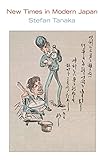New Times in Modern Japan / Stefan Tanaka.
Material type: TextPublisher: Princeton, NJ : Princeton University Press, [2009]Copyright date: ©2004Edition: Course BookDescription: 1 online resourceContent type:
TextPublisher: Princeton, NJ : Princeton University Press, [2009]Copyright date: ©2004Edition: Course BookDescription: 1 online resourceContent type: - 9780691128016
- 9781400826247
- online - DeGruyter
- Issued also in print.
| Item type | Current library | Call number | URL | Status | Notes | Barcode | |
|---|---|---|---|---|---|---|---|
 eBook
eBook
|
Biblioteca "Angelicum" Pont. Univ. S.Tommaso d'Aquino Nuvola online | online - DeGruyter (Browse shelf(Opens below)) | Online access | Not for loan (Accesso limitato) | Accesso per gli utenti autorizzati / Access for authorized users | (dgr)9781400826247 |
Frontmatter -- Contents -- Acknowledgments -- Prelude -- Chapter 1. Discovery of Pasts -- Chapter 2. "Nothing Is the Way It Should Be" -- Chapter 3. Naturalization of Nation: Essential Time -- Chapter 4. Naturalization of Nation: Chronological Time -- Chapter 5. Socialization of Society -- Chapter 6. Socialization of Nature: Museumification -- Epilogue -- Works Cited -- Index
restricted access online access with authorization star
http://purl.org/coar/access_right/c_16ec
New Times in Modern Japan concerns the transformation of time--the reckoning of time--during Japan's Meiji period, specifically from around 1870 to 1900. Time literally changed as the archipelago synchronized with the Western imperialists' reckoning of time. The solar calendar and clock became standard timekeeping devices, and society adapted to the abstractions inherent in modern notions of time. This set off a cascade of changes that completely reconfigured how humans interacted with each other and with their environment--a process whose analysis carries implications for other non-Western societies as well. By examining topics ranging from geology, ghosts, childhood, art history, and architecture to nature as a whole, Stefan Tanaka explores how changing conceptions of time destabilized inherited knowledge and practices and ultimately facilitated the reconfiguration of the archipelago's heterogeneous communities into the liberal-capitalist nation-state, Japan. However, this revolutionary transformation--where, in the words of Lewis Mumford, "the clock, not the steam engine," is the key mechanism of the industrial age--has received little more than a footnote in the history of Japan. This book's innovative focus on time not only shifts attention away from debates about the failure (or success) of "modernization" toward how individuals interact with the overlay of abstract concepts upon their lives; it also illuminates the roles of history as discourse and as practice in this reconfiguration of society. In doing so, it will influence discussions about modernity well beyond the borders of Japan.
Issued also in print.
Mode of access: Internet via World Wide Web.
In English.
Description based on online resource; title from PDF title page (publisher's Web site, viewed 08. Jul 2019)


